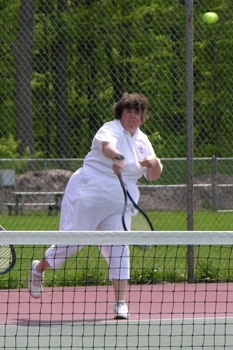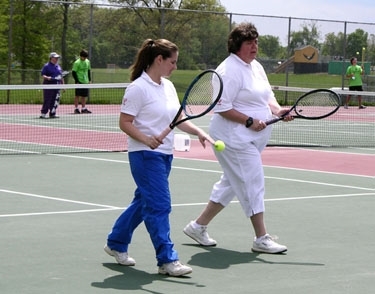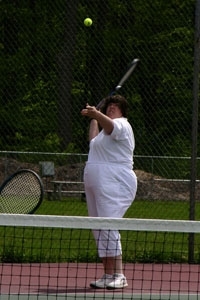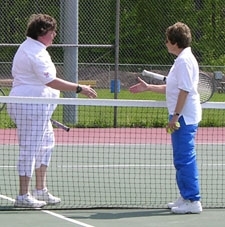 |
| Grace goes for match point. |
Heroism is found within people like Jackie Robinson and Helen Keller, who didn't let labels or misfortunes dim their spirit or will to achieve. These heroes shattered barriers and defied labels, and I couldn't help but think of them when I talked with Grace, a championship-winning tennis player for Special Olympics Connecticut. Grace is first and foremost a person who has accomplished a great deal, despite many disadvantages. Secondly, she is an athlete and a serious competitor. Her abilities have gained her many match points and victories. Grace has placed first at the Connecticut Special Olympics Summer Games for more than a decade, and this summer, she is hoping to do the same at the first-ever National Games in Iowa.
Grace has a remarkable presence on and off the courts. On the courts, she is competitive and focused. She's tall and broad and strong. Off the courts, she is outgoing, with an infectious laugh and sincerity that could make the biggest wallflower feel welcome and confident. In fact, the first time I met Grace, she actually found me. I knew that she was a Special Olympics athlete and that she'd be at a particular event. I knew a little bit about her life from what her coaches had told me. Grace knew even less about me, but, somehow, she spotted me out of the crowd, and came up to introduce herself to me. Within minutes I felt like we had been friends for years--all worries of getting enough information to write an article about someone with an intellectual disability vanished.
 |
| Grace, with Unified Partner Chrissy. |
Grace's love of tennis and of people shines through in the most unexpected of ways. At Connecticut's Southwestern Regional Games this spring, she jumped to the head of the singles tennis competition. It wasn't a surprise since she has a reputation for providing a formidable challenge to her competitors and has consecutively won the Unified Doubles competition at the Connecticut Special Olympics Summer Games since 1992. The surprise, though, is what happened after the win: Grace crossed the court to comfort her opponent, who was in tears. She told the athlete that she played a good game and that she had fun playing with her. "It was just the right thing to do, because I did have fun," says Grace. Not many other athletes would do the same, especially those who are accustomed to winning.
 |
| Grace's serves the ball at Regionals. |
There's much more to Grace than tennis and Special Olympics. Grace grew up with five brothers and sisters in their parents' home in Connecticut. From an early age she played tennis and field hockey, rode horses, and played other sports. While her family supported her efforts and presented her with many opportunities to learn and grow, other people were not as likely to do the same. In high school the kids were hurtful. Daily tauntings were the norm and it didn't get better when she was in the classroom. "I had to have a lady with me...I had to struggle and I wanted to do more. The teacher said, 'no, you do this--stuff envelopes.'" And so, instead of going to math and English class, Grace did a little bit of cooking and a few other classes, and stuffed envelopes, but she always knew she could have done more.
While she may not set out to shatter the stereotype of someone with an intellectual disability, Grace simply does so by living her day-to-day life. She is warm and open, but not overly anxious or naive, as some of the overriding stereotypes might predict in a person with intellectual disabilities. Grace is also sensitive, intuitive, and has a strong sense of self, mixed with a keen desire to take on expectations and exceed them. She does not expect others to ignore the fact that she has an intellectual disability; instead she is looking for people to reach out and work with her on breaking down the barriers that her disability presents. "I want to learn how to express myself better," Grace says. Even though she is articulate and thoughtful, Grace is looking to go the extra mile and be able to explain herself more clearly and elaborate when needed.
Despite being presented with limitations, Grace has passed through many of the Rites of Passage that those without intellectual disabilities take for granted. She has a driver's license, has three-day-a-week job at the local grocery store, she is close to her family, and has friends through church. And she just got her ears pierced. Like many 40-somethings, she is also a caretaker for aging parents. Sadly, Grace lost her father over the winter, but she continues to live with and take care of her mother. She drives her mother to church and other appointments, and makes sure that the family pets are fed and healthy as well. You'll also find Grace driving to work and occasionally to a tennis practice. For her, being able to drive means having freedom. It is the chance to do something that most other people can do--especially since Grace has not always been given the chance to participate in activities that many of us take for granted.
 |
| Grace talks with coach Lyn Nevins after the game. |
Maybe she didn't get to prove it in high school, but Grace certainly shows us now that she can, in fact, do much more than the label of "handicapped" would allow. Her own heroes--especially people like her sister-in-law and her boss at the grocery store--are the ones who try to understand handicapped people and love her for who she is. They give her opportunity to improve and grow as a person, whether it's on the job, or at a family get-together. In turn, Grace teaches us to own up to our own strengths and weaknesses, and to have compassion for others trying to do the same.
Page created on 1/31/2013 12:54:07 AM
Last edited 1/31/2013 12:54:07 AM
